University of York students celebrate success
More than 3,500 men and women will graduate from the University of York this week, each with a story to tell. Here are just some of them:
Following in Grandpa’s footsteps
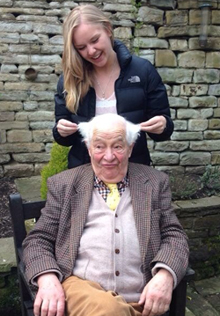
Clare Third and John Ramsden
Clare Third, from Ruddington near Nottingham, is not the first member of her family to have lived in York. In 1945, her grandfather John Ramsden was stationed in Heslington Hall, now part of the University, as part of post-World War II RAF planning.
Working as part of the reserve command after the war, John recently visited York and is proud to see his granddaughter graduate with a BA in History (2:1) on 16 July at 3pm.
Clare (22) says: “My Grandpa has often spoken about his time at Heslington Hall, and is often nostalgic about his time here. It meant a lot to him to go and visit the hall recently, and to spend some time around York together. I have often been proud to study here, knowing that it holds such strong sentimental connections for my Grandpa. Whenever I have passed Heslington Hall I've thought of him as a young man there, and felt glad that I had an opportunity to be young here as well. My Grandpa is passionate about history, and I have been able to take everything I've learnt and discuss it with him by the fire at his home in Derbyshire.”
John, 87, adds: “It is a very happy occasion. I’m very proud to see Clare come through the University, because it brought back memories about what Heslington and the village around it was like before the University came.
“When the war ended in 1945 on VE day, the number 4 bomber group was disbanded, and I came in with a small number of RAF men to set up the Reserve Command. We were tasked with building up the peace structure of the RAF for long term servicemen in peacetime, and getting older men back into university whose education had been disrupted by the war. We consulted them and found out what universities/jobs we could get them into, and tried to get them back into civilian life. Heslington Hall at that time was group headquarters, and covered all the aerodromes in the North of England. After I was there, I was moved to Headquarters at White Waltham and became Deputy Command Education Officer.”
As for Clare’s experience at York, she describes it as “Incredible… York has been an amazing place to live, and I have felt privileged to spend three years here. I have made lifelong friends, and will really miss the community atmosphere. Studying History in such a historic place has made the subject come alive in many ways during my degree, and being a part of the Department of History has also been a huge highlight of my time here.
“Highlights have been: watching the sunrise on Clifford's Tower, being Events Manager for the International Development Society, all the time spent laughing and despairing in the library with other History students, spending the day with two friends eating our way from one end of the 'Taste Yorkshire' festival to the other (we ate at 25 stalls!), finally getting up the courage to play my guitar and sing at acoustic gigs in front of encouraging friends, working as a receptionist for the University gyms and taking up Squash, playing rounders in the summer, and dodging angry geese.”
Clare will now spend the summer travelling through the USA before returning to the UK in September to study for an MSc in Conflict, Violence and Development at the School of Oriental and African Studies (SOAS) in London. In the future she hopes to work in international development, specifically in disaster management and peacekeeping in conflict zones. Clare says: “Thank goodness there are good train connections from London back to York!”
Age no barrier to success
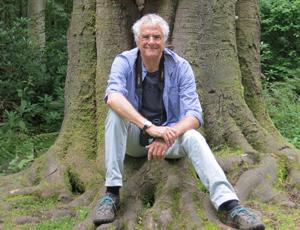
Howard Peters
Howard Peters will be 71 when he graduates with a PhD in Environmental Management & Environmental Economics on 16 July.
Born and raised in London, Howard has previously lived in Warwickshire and Bath before moving to York. He says: “I have a business background, first in IT and subsequently in imports, nothing that really relates to my doctoral research. However, as a passionate diver, I’ve always had an interest in the marine environment, and later I worked with a number of NGOs surveying coral reef systems around the globe for conservation initiatives. This developed into a wider interest, and to learn more I approached the leading conservation biologist in the field, Professor Callum Roberts at York, who, with Dr Julie Hawkins, enrolled me onto their new Masters course in Marine Environmental Management at the Environment Department.
“I graduated with distinction, and I was so enthused by my chosen field of study that it was proposed I undertake a PhD to research the conservation status of the marine gastropod genus Conus, known commonly as cone snails, a promising source of biologically active compounds for the development of novel drugs.”
Highlights of his PhD include organising and chairing an international workshop in Chicago to review the assessment for the IUCN Red List of all 632 species of cone snails – the first marine gastropod genus to be so assessed. This brought together a large team of Conus experts from around the world for a week of peer review. Howard’s paper ‘Conus: First Comprehensive Conservation Red List Assessment of a Marine Gastropod Mollusc Genus’ was also accepted for publication by the online scientific journal PLOS ONE.
Having returned recently from a research trip to Florida searching for new mollusc species, Howard looks forward to further work in his field.
He says: “Despite my years my research has, I believe, made a practical contribution to marine conservation science. I should like to build on the experience and expertise that York has provided, and use the important personal connections made during my studies to help secure the future of some of the most endangered of the species we assessed.”
Music/history combination proves winning formula
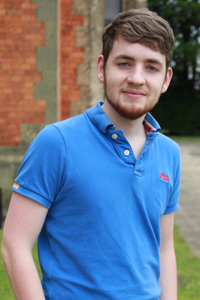
James Beddoe
For James Beddoe (22) York proved the perfect place to follow his two passions – music and history. While he will graduate with a degree in History, he has also been a member of numerous York ensembles and music societies.
In September, he will join the Worcester Cathedral Choir as a song man, a paid position which involves taking part in weekly services and the busy Easter and Christmas programmes. He is also one of six York students selected to join Genesis Sixteen, a well-respected national ensemble which has helped launch the careers of many young singers.
James, from Southwell, Nottinghamshire, says: “York’s Departments of History and Music are both excellent, and the pliancy of their courses enable students to have a unique experience. In my case I was able to look at musical history – for example the music of the Anglo-Saxon church - as part of my course. I don’t think I would have been able to follow my interests in quite the same way anywhere else.”
The flexibility in York’s degree structure meant James was also able to take an elective module in Early Renaissance vocal music with the Department of Music in his second year. He also took the opportunity to combine history and music for his dissertation, which was on the symbolism, ceremony and vitality of sacred music in the reign of Mary I.
“The musical evidence we have from the period complements recent historical studies in this field,” he says. “The Catholic restoration movement, which included the compositional powers of some of England’s finest musicians, was able to cultivate an extraordinary outpouring of devotional works that redefine our understanding of Mary’s short but controversial reign.”
At eight years old, James became a chorister for Southwell Minster and while at York, has deputised with the York Minster choir. He has also been a member of the University Choir and Chamber Choir, Yorkshire Bach Choir, The 24 and the University of York Symphony Orchestra – among many others.
He was a key figure in the University’s Opera Society, with lead roles in Weber’s Der Freischütz and Offenbach’s Orpheus in the Underworld. As Treasurer of the Opera Society, he has helped the student society become more financially viable and to stage a performance at York’s Grand Opera House.
Being part of the York progressive ensemble The 24, which is conducted by Robert Hollingworth, the founder and director of professional ensemble I Fagiolini, is one of the highlights of James’ time at York.
He says: “The 24 was a big commitment, but it has offered some fantastic experiences such as trips to China and Germany and performing on BBC Radio 3. The China trip was absolutely spectacular; I had studied modern Chinese history within my History degree, enhancing what was already an amazing cultural experience, but it also gave me an opportunity to work with some great conductors and fantastic singers.”
James will graduate with a 2:1 degree in History on 16 July at 3pm.
Enterprising student sets up education charity

Hayley Carr
Hayley Carr, from Hackney in East London, attended both state and private schools before coming to York.
“I am from two very different worlds that need to be bridged; that I believe can be bridged. The first is that of my home in Hackney and the primary state school I went to across the road, Lauriston. The second is that of my private secondary school I attended on a scholarship, City of London School for Girls. There is equal potential in both yet I saw in my latter education there was often a strong inspirational, mobilised ethos that taught me what it means to become ambitious, confident, and a vocal leader.”
Lauriston Lights, a two week summer camp for high achieving 11 year olds from low socio-economic backgrounds, was born out a desire to bridge this gap, inspiring and encouraging high academic standards for bright children from areas with historically low levels of academic achievement.
Hayley says: “The inspiration behind Lauriston Lights is largely a personal one, and along with my co-founders Jessica Clark Jones, Adam Seldon and Joel Fenster, we saw great untapped potential in using university students to achieve our aim. The summer camp focuses on developing key character strengths such as grit and curiosity, encourages critical thinking and offers individual mentoring to inspire aspirational thinking.
“Using innovative teaching tools such as the SAPERE-certified 'Philosophy for Children’, which involves debating and communication workshops designed by university students, we hope to build a sustainable model that university students can replicate across the UK, building a network willing to be part of our mission.”
In addition to establishing a charity, life at York has provided the ‘perfect place’ in which to study.
Hayley says: “I like small, intimate environments and this is exactly what York has provided as a campus university. My most important memories include moving into my second year house for the first time, organising RAG events such as 'Mr and Mrs. Derwent’, ‘Derwent's Got Talent’ and a fundraiser for Lauriston Lights, Derwent’s Summer Soiree, a formal 1920's themed fashion show. Ultimately, some of my most important memories are the small moments I have shared with close friends who I will know for life.”
Hayley will go straight from graduating into TeachFirst training. She says: “I will be a primary school teacher in a new free school called School 21, teaching Year 2. My plan is to teach and develop Lauriston Lights summer camps in Newham and potentially other boroughs in London.”
Hayley graduates with a First class BA in Politics and International Relations on Friday 18 July at 5.30pm.
Campaigning philosophy student takes on Sea World
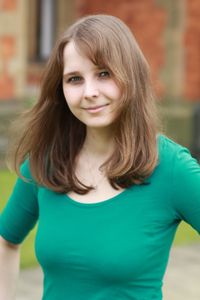
Kathleen Haase
Kathleen Haase (25) has already applied her Philosophy degree in a practical way by campaigning for the rights of killer whales, setting up a petition to persuade British Airways to stop selling trips to SeaWorld.
With documentaries such as Blackfish highlighting the plight of orcas in captivity, Kathleen is campaigning to persuade the airline to end their partnership with SeaWorld. Campaigning with the support of Whale and Dolphin Conservation (WDC), a leading global charity, her petition has gained over 107,000 signatures in just six weeks.
Kathleen says: “Many scientists say that orcas are not suitable for captivity because they are self-aware, very intelligent and live socially complex lives. Their life spans are drastically reduced by approximately 2.5 times in captivity compared with an average age of 30-40 years in the wild.
“Alongside, I am also writing some articles for the WDC on personhood which is interesting from a philosophical perspective. A person is considered to be a human being but the criteria we have for personhood are fulfilled by other species as well, such as orcas, bottlenose dolphins, elephants and chimpanzees. Why do we not grant other species personhood and moral status if they fulfil the criteria?”
Kathleen, originally from Germany, would like to build on this work and work in Marine Conservation in the future. She says: “My personal goal is to establish non-human personhood for cetaceans, but that is very ambitious. A smaller goal would be to ban cetacean captivity for entertainment purposes globally. Idealistically, I would like to combine my backgrounds in Philosophy and Ethics with Marine Conservation, either writing about personhood or going into further study required for working in this field. I find the topic of personhood fascinating and strongly believe that we need to protect our oceans better. If I could contribute anything towards that, it would be a dream come true.”
Kathleen graduates with a BA in Philosophy (2:1) on Friday 18 July at 5.30pm. Her petition can be found here: https://www.change.org/en-GB/petitions/british-airways-stop-selling-trips-to-seaworld-end-your-support-for-these-cruel-orca-circuses.
Research places spotlight on peace education in Kenya

Solvor Mjøberg Lauritzen
While studying towards a PhD with the Institute for Effective Education at York, Solvor Mjøberg Lauritzen spent five months in Kenya working as an intern for the UNICEF country office.
Her PhD thesis on Building a Culture of Peace: Peace Education in Kenyan Primary Schools investigated the role of education in peace building in Kenya following the 2007/08 post-election violence.
Solvor (28), from Norway, says: “I would have loved to say that Kenya was solely a good experience, but it was also rough. Doing research in traumatised, poor neighbourhoods exposed me to so much evil and hopelessness. As I was there for five months I got close to the communities I was working in, making it even harder to witness the situations the children and communities were in.
“I was there digging into the traumatised history of the country and I like to think that I got to the truth: a very ugly truth of how colonialism, poverty and war can destroy communities. But also a truth representing hope. I found a generation of children who wanted to build a Kenya with a more stable democracy. And I found teachers who were dedicated to teaching the children what they needed in order to do so. I found high-level stakeholders - Ministry of Education, UNESCO, UNICEF - who were working to aid the teachers in carrying out this task. My research was therefore very much about transformation – about moving from darkness to light.”
Solvor’s analysis played a central role in UNICEF’s evaluation of the peace building programme being implemented in all primary schools by the Ministry of Education. Her study found that education can indeed build peace, and that the Kenyan peace education programme can play a role in this.
Solvor’s time at York began with a one-term exchange from Norway as a 19-year-old undergraduate. She then returned to York to do an MA in Teaching English to Speakers of Other Languages (TESOL) with the Department of Education, followed by her PhD.
She says: “I loved York from when I first arrived as an undergraduate student. One thing I particularly enjoyed was meeting people from all around the world. I now have friends from China, Saudi Arabia, Syria, Turkey, Mexico and Sri Lanka to mention a few. I feel extremely privileged to have been allowed such connections and the friendships have really broadened my perspectives. This has also influenced my academic perspective. Doing my PhD with the Institute for Effective Education was also a privilege, as I was allowed to work with experts in their fields.”
Since finishing her PhD, she has worked as a Lecturer at Telemark University College in Norway in the Department of Teacher Education. From August she will take on a new role with the Department of Social Sciences at the Norwegian School of Theology in Oslo where she will continue her research into peace education.
Solvor will graduate with a PhD in Education on 16 July at 3pm. Six of her close relatives will fly out from Norway to attend the ceremony.
York Union enjoys success
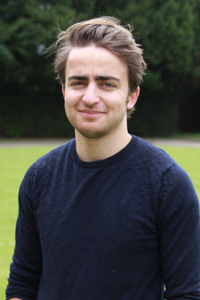
Adam Seldon
Adam Seldon (22) is the co-founder of the York Union, a student-run organisation that has brought Alastair Campbell, Tanya Byron, Mark Lawson and many other high-profile speakers to York.
Established in 2013, the York Union aims to host engaging talks, interviews and debates that contribute to the intellectual life of the University and surrounding area. It grew from the foundations of Nouse Events, set up by Adam and fellow student Harry Lambert in 2012.
Adam, from Brighton, who will graduate with a degree in History, says: “In our first year at York, Harry and I went to a number of talks at the University, but found some were poorly attended and not well-advertised, and often the speakers were not of a high calibre.
“To address this, in our second year Harry suggested we set up Nouse Events. This was affiliated to the student newspaper Nouse, and attracted some big-name speakers such as Jeremy Paxman and George Galloway. At the end of our second year we expanded Nouse Events to form the York Union, an independent body modelled on the Oxford and Cambridge Unions, widely regarded as some of the finest speaking chambers in the world.”
The York Union’s first event was a debate on religion, chaired by Adam, which took place before a packed audience. Subsequent debates have covered topics including immigration, happiness and Thatcherism.
Adam says: “The York Union has had a very successful first year attracting some great speakers including Jonathan Powell, Downing Street Chief of Staff under Prime Minister Tony Blair, journalist Mark Lawson and Adam Boulton, Political Editor for Sky News.
“It’s been really good to see so many members of the local community attend as well as students. We also attracted funding from KPMG and have linked up with other University societies such as The Yorker, Nouse and the Debating Society to organise events.”
Adam has also played a full part in Derwent College life, including twice organising a Derwent team to compete in the Tough Guy Competition – a 15km assault course and cross-country run. In addition, he was shortlisted for The Guardian student columnist of the year for his work with Nouse and is involved in Lauriston Lights, a charity which is raising children’s aspirations in Newham through a summer programme delivered by University volunteers.
Adam, who is going to study towards a Masters degree in Political Theory at the London School of Economics, is leaving the York Union in the hands of a new committee and is confident it will continue to thrive.
Adam will receive a BA (First class honours) in History on 16 July at 3pm.
Working in China
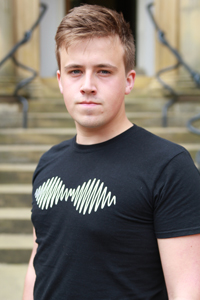
Ellis Goldney Sidney
Ellis Goldney Sidney (21), from Bournemouth, is heading out to Beijing this summer for a two month internship with the British Council.
Part of a scheme called Generation UK, Ellis says: “I am most looking forward to living in Beijing's Central Business District and the challenge of working with Mandarin speakers, speaking no Mandarin myself.
“I have loved my time at York in every way I can think of. I loved living, and later working, on campus. In my first year, I lived in Derwent College, and the community was really fun, vibrant and supportive. A particular highlight was playing college football. I captained the 4th team for four terms, which was challenging but really fun. I also really enjoyed presenting a radio show on University Radio York for two years. My most important memories though undoubtedly centre around time spent going out and relaxing with my pals.
“After my internship, I plan to return home and work full-time for 11 months, before doing an MSc Social and Cultural Anthropology at the University of Amsterdam. While I am in Amsterdam, I plan to apply for the Civil Service's fast track graduate scheme. Then, I plan to get a girlfriend.”
Ellis graduates with a BA in Philosophy (2:1) on 18 July at 5.30pm.
National exposure for York research
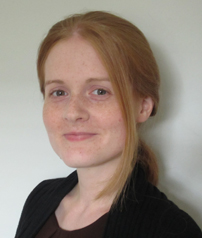
Rachel Thwaites
Radio 4’s Today programme presenter John Humphrys has developed a formidable reputation as an interviewer. While many would have quaked at the thought of being questioned live on national radio by someone whose name has become a byword for combative interviewing, PhD student Rachel Thwaites took it in her stride.
During her last year at York, Rachel, who studied with the University’s Centre for Women’s Studies, became used to intense media scrutiny of her research. As well as Radio 4, she was interviewed by The Times, The Telegraph, BBC Radio Scotland and numerous other media.
Rachel, who is originally from Edinburgh, says: “My PhD thesis was onWomen, Marriage, and Selfhood: How Names Impact upon Gendered Identity and the media interest in my project came out of the blue. Facebook had commissioned a study on what women were doing with their last names and the media were looking for someone to comment on that.
“I could of course bring the context of my study to the Facebook results. I hadn’t thought about the fact my project could be interesting to the media at that point, so to start getting so much attention so suddenly was quite a surprise!
“Around six months later I got another wave of interest in my project because France was passing an equalities bill which included a section about names. As France has a different practice to the UK, the media were interested in getting comment on this difference and what the situation was like in the UK at the present time.
“I was asked to speak on the Today programme on BBC Radio 4. This was a fantastic opportunity to speak about my research and to engage in discussion around names on a national platform. I was nervous of course, but couldn’t pass up such a great chance. It brought a lot more attention to my research and sparked some further media debate, which was great.”
Rachel joined York after completing an undergraduate degree in History and Gender Studies at the University of Aberdeen. She says: “Women’s Studies is a small and supportive department where I met lots of great like-minded people and was able to spend three years focusing on research that I was interested in and enjoyed carrying out.
“I tried to make the most of my time there and get involved with what was going on in the department, as well as making links with people working in other departments. I gained teaching experience and took part in the Preparing Future Academics programme to become an accredited member of the Higher Education Academy. I was part of the Women’s Committee and had a great time campaigning on and off campus.”
Rachel is now working as a Research Fellow at the Health Services Management Centre, School of Social Policy, at the University of Birmingham looking at emergency admissions of elderly people to hospital and what can be done to prevent these.
Rachel will receive a PhD in Women’s Studies on 18 July at 3pm.
Creative writing workshops benefit York children
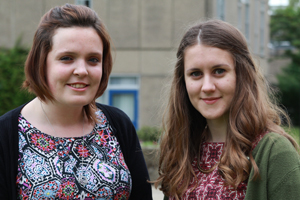
Hannah Trott and Sara Dimmock
Hannah Trott and Sara Dimmock will leave York knowing they have made a real difference to the lives of dozens of primary school children across the city.
A year ago, the 21-year-old English Language and Linguistics students set up Inkwell, a creative writing project, which has benefited children from Headlands, Badger Hill, Tang Hall, St Lawrence’s, Haxby Road, Yearsley and Burton Green Primary Schools.
Hannah and Sara developed three programmes aimed at seven to 11 years olds - News Flash, Poetry Lab and Story Makers - which University student volunteers deliver as a series of eight after-school creative writing workshops.
Hannah, who is originally from Worthing, says: “Schools can choose which of the three programmes they wish to follow and which children they would like to involve. The sessions are designed to be completely different to lesson times with lots of games and activities. For example, we have punctuation super heroes including Captain Pow (full stop) and Chit and Chat (speech marks), with the children getting to wear the hero’s cape and swoop in to save the sentence!”
Inkwell has established strong ties with the University’s Careers team and is accredited by the Children’s University.
Sara, from Hull, says: “Inkwell has been a great experience and it’s been really rewarding for the student volunteers to get to know the pupils and to see the improvement in their writing. Recently we received a really lovely thank you card from a parent who said she had been taken aback by the huge difference the club had made to her child’s work.
“Inkwell is very inclusive and we have student volunteers studying Astrophysics and Accounting, not just from disciplines you might expect, such as English and Education.”
This term, Inkwell delivered a four-week programme around the Tour de France, developed by a sub-committee of five volunteers. Called Destination York, the programme focused on poetry and writing about the city of York and places you can visit by bike.
In June, Inkwell ran a special creative writing day called Around the World for four primary schools at the University’s Ron Cooke Hub. Involving 88 pupils and 38 student volunteers, pupils used passports to visit five continents, each of which concentrated on a different style of writing. Hannah says: “The feedback was fantastic and it was great to hear how pleased everyone was.”
With a new committee in place, Hannah and Sara are confident that Inkwell will continue to go from strength to strength. This month Hannah started working for Reading University Students Union as a Volunteering and JCR Coordinator, while Sara is going to start a teacher training course at York St John’s University in September.
Sara will graduate with a First class degree and Hannah with a 2:1, both in English and Linguistics, on 17 July at 9.15am.
Masters success demonstrates determination to succeed
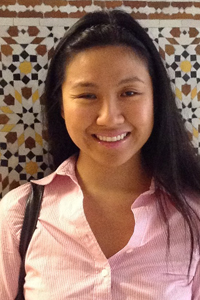
Linda Tom
Canadian-born Linda Tom works full-time for UNICEF in the Central African Republic (CAR) and will graduate with a Masters in Public Policy and Management.
She completed her Masters part-time online between September 2011 and October 2013 during a period of major upheaval in CAR, which saw her evacuated from the country on several occasions.
Linda, 39, who is originally from Montreal, says: “It was really hard and I can’t believe I graduated. I started my Masters just before moving to CAR. After being there for about 11 months, conflict broke out. I was evacuated to Cameroon in January and had to leave my books behind. Things seemed to have settled down so we went back to CAR, but then I got really sick and had to go to Canada for treatment.
“By the time I got better, there was a coup d’état in CAR and I was evacuated again. Back in Cameroon, every day we followed the news closely on CAR. As the situation worsened, we moved from a hotel to an apartment. Morale was low and I found it difficult to concentrate. Sometimes I would not be able to reach the team in CAR for days. For my studies, I went months without my books and study materials, but luckily a lot of it was available online. I finally returned to CAR in July, but was not allowed to return to my home. I lived out of a hotel for a month before we were able to settle back in.”
Linda is the Chief of Communication for UNICEF in CAR, working with international and national media, celebrities and fundraisers to bring attention to the crisis in CAR which has devastated the lives of 2.3 million children. She recently brought Mia Farrow to the country to bring attention to the crisis and hosted a trip for the Spanish and French UNICEF fundraising offices.
As Linda works full-time, online study was her only option. She chose York due to its reputation and because she liked the programme. As part of her studies, she wrote a thesis on the nature of the fragile state, using CAR as a case study.
Linda says: “I was interested in what happens in the absence of a functioning government. Also, how the provisions of public services present special challenges, where non-state entities have established a presence to provide emergency relief. Using Moore’s concept of political underdevelopment as a framework, the issues of governance were also examined in light of the March 2013 coup d’état that left the country without a functional government and brought health, education and social services to a halt.
“The York course really grounded me. Sometimes it’s difficult to contextualise what is happening and it’s important and healthy to criticise how we work. Knowing the history of public administration and aid is really important to understand where we are and where we need to go. Specific tools like gap analysis were also very helpful.”
Linda will graduate with a Masters in Public Policy and Management on July 18, but will be unable to attend the ceremony.
